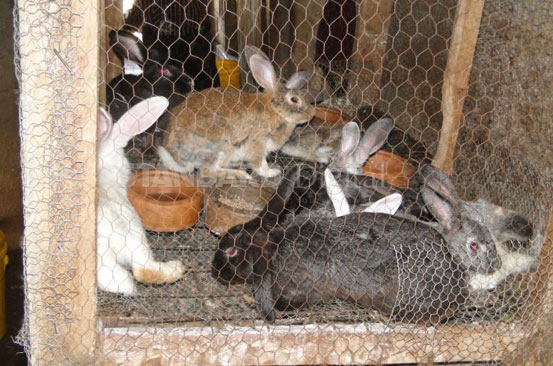To begin with, there are several benefits of commercial rabbit farming in Kenya. The main benefits of rabbit farming business in Kenya are listed below.
- Rabbits are very fast growing animals like broiler chicken. They gain maturity fast and become suitable for slaughtering purpose within 4-5 months.
- Rabbit gestation period is less (generally between 28-31 days) and a doe give birth of kids after every 2 months. Each time one doe can give birth of 2-8 kids.
- Starting rabbit farming in Kenya requires very little capital or investment. Even, you can start rabbit farming business in a well ventilated small space.
- Food to meat converting rate is higher on rabbit than any other livestock animals.
- Rabbit meat is very tasty and nutritious. All types and all aged people can easily consume and digest rabbit meat.
- Feeding costs for commercial rabbit farming in Kenya is also very less. You can easily feed your rabbits kitchen wast materials, grasses, plant leaves etc. with their regular commercial feed. This will help you for reducing feeding cost.
- Commercial rabbit farming in Kenya can be great source of income and employment. You can successfully use your family labor for rabbit farming business. Rabbit farming is also very pleasuring and entertaining.
Starting Rabbit Farming Business in Kenya
Starting rabbit farming in Kenya requires very low investment. It’s very easy to set up and raising rabbits commercially. Here I am describing the steps for starting commercial rabbit farming business in Kenya.
Breeds For Commercial Production
Choosing suitable breeds for commercial rabbit farming in Kenya is most important. The common rabbit breeds used for commercial production in Kenya are California White, Flemish Giant, New Zealand White and some other local cross breeds. All those breeds are suitable for commercial production according to the environment and climate of Kenya. Choose breeds according to your desired production.
Housing
Making suitable rabbit housing is the most important part for rabbit farming in Kenya. Rabbits are very clean animal. They love to stay in neat and clean house with good ventilation system. You can raise rabbits in both deep litter and cage methods. Choose the method according to your production type and investment capability. Some important factors to consider which constructing house for commercial rabbit farming in Kenya are described below.
- Depending on the breeds, various breeds vary in their weight. Generally, an adult rabbit weights between 2-7 kg. And for commercial production 1200-1500 squire centimeter clean space is required for 1 kg weight. That means 80cm * 80cm space is required for a medium sized rabbit.
- Doe needs extra space for proper growth. 80cm * 115cm space is perfect for an adult medium sized doe.
- Keep the kids or young rabbits in a group until they reach 4 months of age. 20-30 young rabbits can be kept in each group.
- Proper ventilation system in the house is very essential. You can cover the walls, doors, roofs of a hutch with chicken wire netting or made up of bamboo or wood placed 20mm apart. This system is suitable for hot tempered areas.
- In cold tempered areas, you can easily make a house with solid wall and roof.
- Make a drain inside the house so that you can easily clean the house.
- Clean the feeding and watering equipment inside the house on a regular basis.
Feeding
Sufficient amount of nutritious and balanced diet food keeps the rabbit healthy and productive. For commercial production, you can feed your rabbits commercially prepared supplementary feed. This type of foods are available in the market. Along with this you can add kitchen garbage, grasses, leaves of various trees etc. This will help you reducing feeding costs. Sufficient amount of clean and fresh water is also required with proper nutritious rabbit feed.
Breeding
Rabbit grows very fast and gain maturity earlier. They become suitable for breeding within their 6 months of age. The gestation period of rabbit is less compared to other livestock animals. Generally, a doe give birth of kids after every two months. Each time one doe can give birth of 2-8 kids. Gestation period stays for 28-31 days.
Care & Management
Take some extra care and management to your rabbits. Vaccinate them timely to keep free from all types of rabbit diseases. Never feed them polluted or expired food. Try to monitor all their activities.
Marketing
Marketing process is most important part of rabbit farming in Kenya. Basically, there are no formal markets for selling rabbit products so far like chickens, goats or fish. But rabbit meat slaughter houses are coming up due to the high popularity and increasing demands of rabbit meat. Right now you can try the local market, restaurants and supermarkets. Rabbit meat has a huge demand in China and some other countries. So, if you have sufficient facilities then try to export to foreign countries.
Every business goes with some problems. Don’t fear about marketing your products. Formal markets are not available right now. But the rabbit meat popularity and consuming rate is increasing rapidly. And a suitable market place is coming up soon. So, for earning some extra income, start commercial rabbit farming in Kenya.








